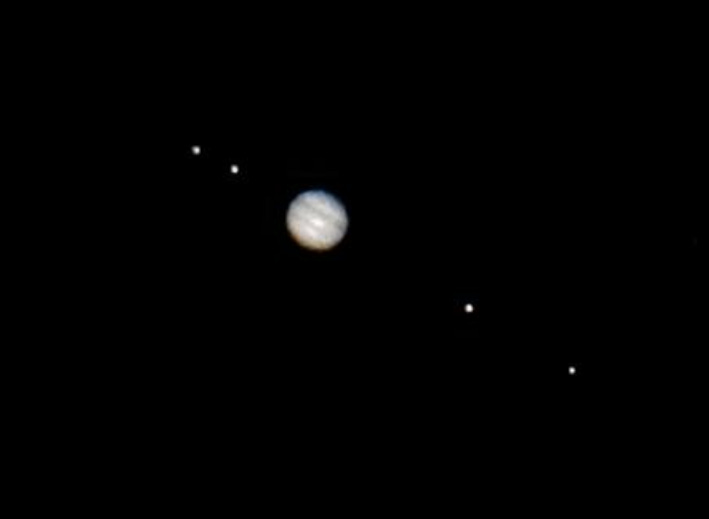January 7th, 1610: Galileo Discovers Earth Isn't the Cosmic Center
On This Day - On January 7th, 1610, as Galileo Galilei peered through his telescope, the stars above whispered a secret that would forever alter our place in the cosmos.
On the night of January 7th, 1610, the heavens above whispered a secret, a revelation so impactful it would rattle the very foundations of human understanding.
Imagine if you will:
Galileo Galilei, perched in the frosty air of an Italian winter, his eyes squinting through the lens of his primitive telescope.

The stars twinkled mockingly, unaware that they were about to concede one of the universe's greatest secrets.
Galileo was no ordinary stargazer.
Oh no, he was a stubborn contrarian, a man who thought for himself, not what society told him.
And on that fateful night, he saw something extraordinary - four points of light dancing around Jupiter like fireflies around a campfire.
Ganymede, Callisto, Io, and Europa – the Galilean moons, though he couldn't quite tell Io and Europa apart until the next night.
It was the first time in the history of ever that a human had observed objects orbiting something other than Earth.
I know!
It’s hard to believe.
Today it seems painfully obvious Earth is not the center of the Universe, but that’s only because of Galileo’s discovery on this day in 1610.
Let's rewind a bit.
Back in the day, everyone and their mother believed in the geocentric model – the idea that Earth was the center of the universe, and everything else was just window dressing.
It was the ultimate ego boost for humanity, and the Church was its biggest cheerleader.
According to them, we were the celestial apple of God's eye, and everything else, including the sun, was on a cosmic carousel around us.
But Galileo, the rebel, had other ideas.
His observations were a slap in the face to the geocentric model.
The moons orbiting Jupiter?
That was like finding a secret chapter in the Bible—pages torn and found later.
Suddenly, it wasn't all about us anymore.
The universe had other plans, other centers of attraction.
The Church, as you can imagine, was not amused.
"Blasphemy!" they cried, clutching their pearls and their crucifixes.
How dare Galileo contradict the Holy Scriptures with his so-called "observations"?
The man had the audacity to suggest that the Earth orbited the sun – heliocentrism, they called it.
It was like saying the Earth was flat (oh, the irony).
Galileo's trial was the talk of the town.
So there he was: an old man, standing alone against a tribunal of stern, robed figures, the air thick with incense and intolerance.
The Church demanded he recant his "heretical" ideas.
Galileo, under the immense pressure and the threat of the Inquisition's not-so-tender mercies, begrudgingly agreed.
But legend has it that as he rose from his knees, he muttered under his breath, "E pur si muove" – "And yet it moves."
His sentence?
House arrest – a gilded cage for a mind that roamed the stars.
But even confined to his villa, Galileo's ideas couldn't be shackled.
They spread like wildfire, igniting minds across Europe and beyond.
This wasn't just about astronomy; it was a cosmic paradigm shift.
Galileo's telescope became the sword that slew the dragon of ignorance.
His findings beckoned to a future where science, not dogma, would light the way.
It was the dawn of a new era – the Scientific Revolution.
Galileo's legacy is a testament to the power of truth, of standing up for what you believe in, even when the world tells you you're wrong.
He taught us to question, to explore, to not just accept the obvious.
The universe was no longer a two-dimensional canvas with Earth at the center; it was a wondrous, multi-layered fabric, full of mysteries waiting to be unraveled.
In the grand scheme of things, Galileo's discovery was a cosmic wake-up call.
It was a reminder that we are but a tiny part of an unfathomably vast universe.
His defiance, his unyielding pursuit of truth, laid the groundwork for the Enlightenment, for the countless discoveries that would follow.
So, the next time you gaze up at the night sky, remember Galileo and his four moons.
Remember the man who dared to challenge the status quo, who saw beyond the horizon of accepted knowledge.
In the infinite expanse above, there's a bit of Galileo in every twinkling star, in every orbiting moon, whispering to us that the universe is full of wonders, waiting for those bold enough to seek them out.


